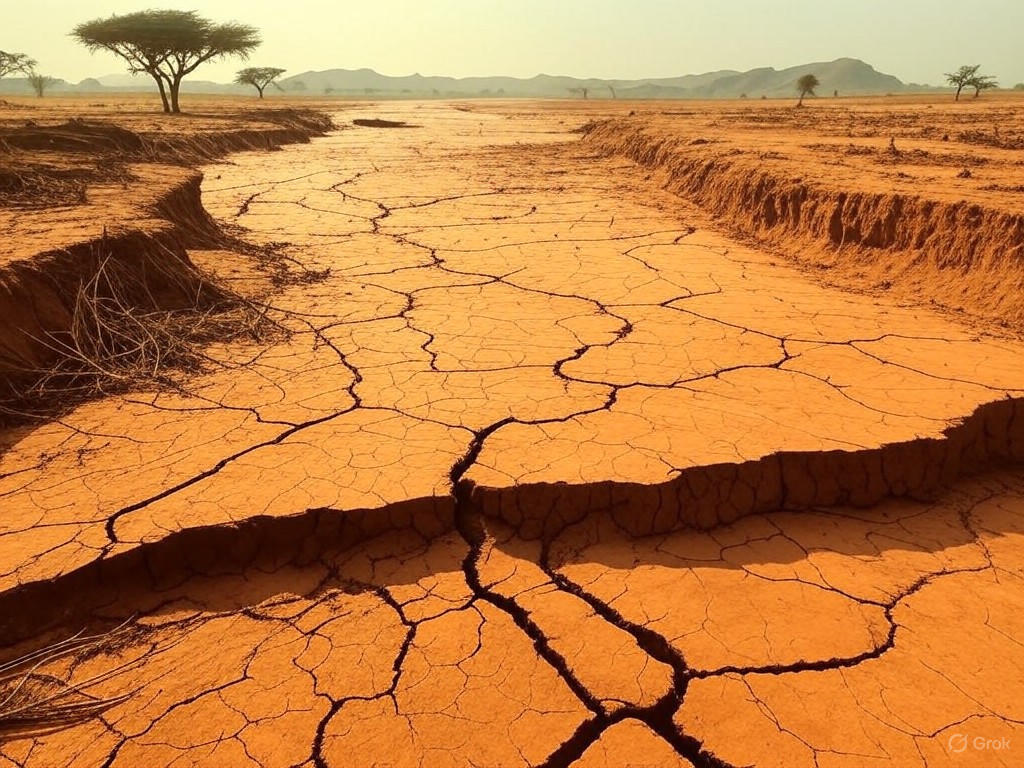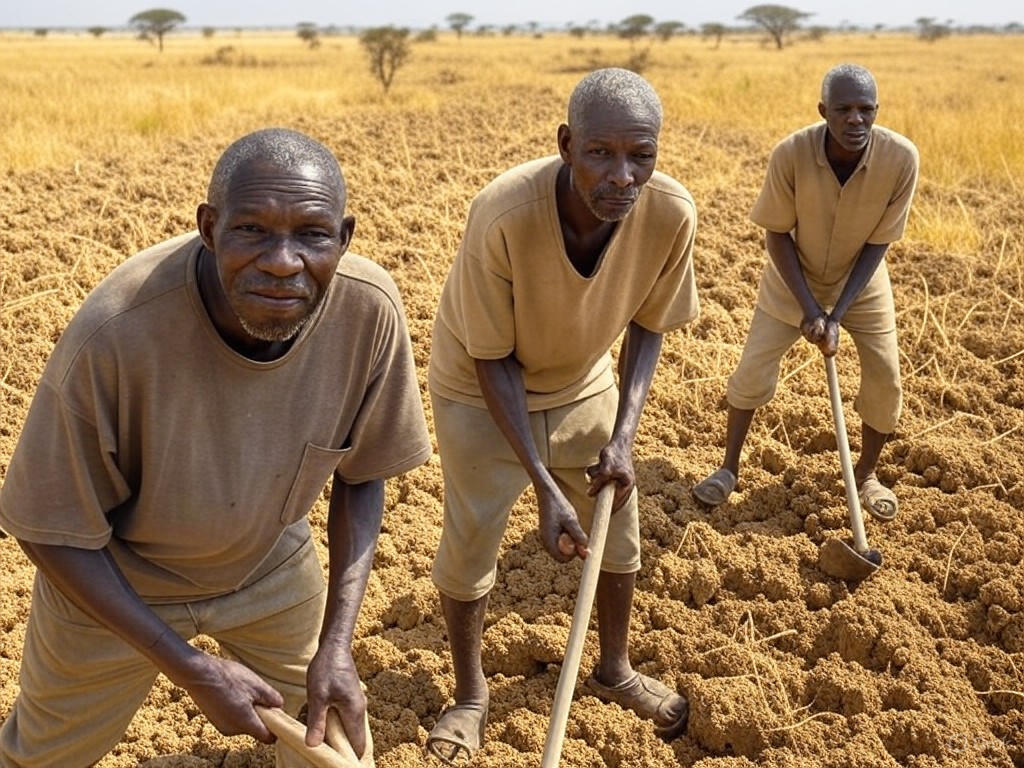Global Water Crisis: Sub-Saharan Africa’s Drought Worsens
In the vast savannas and arid plains of Sub-Saharan Africa, where the rhythm of life has long been tied to the ebb and flow of seasonal rains, a deepening crisis unfolds. Picture parched earth cracking under the sun's relentless gaze, rivers reduced to trickles, and communities forced to ration what was once abundant. This is not merely a local tragedy but a harbinger of the broader water crisis, where worsening droughts driven by climate change threaten to upend global stability. As Davin Thorow, I approach this issue with the deliberate reflection of a writer attuned to nature's lessons, advocating for solutions rooted in free-market principles, individual resilience, and the stewardship of traditional values. Yet, the call for international aid grows urgent, demanding we balance compassion with practical wisdom to avoid the pitfalls of overreliance on government intervention.
The Roots of the Crisis: Droughts and Their Ripple Effects
Sub-Saharan Africa's droughts are no fleeting anomaly; they represent a accelerating challenge intertwined with climate change, exacerbating water scarcity across the region and beyond. Here, in nations like Kenya and Ethiopia, prolonged dry spells have transformed fertile lands into dust bowls, disrupting agriculture and forcing millions into humanitarian distress. According to recent analyses, the Horn of Africa alone has seen rainfall deficits of up to 50% in recent years, leading to crop failures that ripple through global food chains (World Bank Report on Water Scarcity).
What makes this crisis particularly acute is its human dimension. Families, often led by resilient farmers drawing on centuries of traditional knowledge, face not just thirst but the erosion of livelihoods. In rural villages, women and children trek miles for contaminated water sources, heightening risks of disease and malnutrition. This is not an abstract statistic but a lived reality: the United Nations' humanitarian appeals highlight how droughts have displaced over 1.5 million people in the Sahel region since 2022, straining local economies and underscoring the interconnectedness of global water resources.
From a center-right lens, we must recognize that while climate patterns have always fluctuated, human ingenuity and market-driven adaptations offer a path forward. Excessive government-led interventions, such as blanket subsidies or sprawling aid bureaucracies, often stifle local innovation. Instead, empowering private enterprises to invest in water-efficient technologies—think drip irrigation systems or solar-powered desalination—could foster sustainable growth without perpetuating dependency.

This image captures a once-vibrant riverbed in the Sahel region of Sub-Saharan Africa, now a barren scar, symbolizing the human cost of prolonged droughts and the urgent need for adaptive strategies.
Analyzing the Global Implications: From Local Hardship to Worldwide Concerns
The droughts in Sub-Saharan Africa do not confine their impact to the continent; they amplify the global water crisis, affecting trade, migration, and international relations. As water tables dwindle, agricultural output plummets, driving up food prices worldwide and exposing vulnerabilities in global supply chains. For instance, Ethiopia's coffee exports, a staple in international markets, have dropped by 30% in drought-stricken areas, according to a Wall Street Journal analysis. This interconnectedness demands a response that prioritizes efficiency over expansive aid programs, drawing on free-market mechanisms to encourage innovation.
At the heart of this analysis is the role of climate change as a catalyst. While environmental shifts are inevitable, their exacerbation through poor resource management highlights the need for limited government involvement. Over the past decade, international aid has poured into the region, yet outcomes remain mixed. Reports from organizations like the International Institute for Environment and Development indicate that much of this aid has been misallocated, with bureaucratic delays and corruption siphoning resources away from grassroots efforts. A center-right approach would advocate for public-private partnerships, where incentives like tax credits for water conservation technologies spur private investment, rather than top-down mandates that expand government control.
Balanced consideration requires acknowledging the humanitarian imperative. The suffering in Sub-Saharan Africa is real and demands empathy, but we must temper aid with accountability. Traditional values of self-reliance, as embodied in community cooperatives and local farming practices, offer a blueprint for resilience. By fostering markets that reward efficient water use—such as carbon offset programs tied to water conservation—governments can play a supporting role without overstepping, ensuring that aid empowers rather than enables dependency.
Evidence of Escalation: Data and Real-World Examples
Evidence from recent years paints a stark picture of the water crisis's progression. In Somalia, where droughts have persisted for four consecutive rainy seasons, over 6 million people face acute water shortages, leading to a 20% increase in child mortality rates, as documented in a UNICEF report on humanitarian crises. Similarly, in Nigeria's Lake Chad basin, once a thriving waterway, evaporation rates have outpaced replenishment, shrinking the lake by 90% since the 1960s and displacing communities that relied on fishing and farming.
These examples underscore the need for evidence-based solutions. Market-oriented innovations, such as private-sector development of affordable rainwater harvesting systems, have shown promise in pilot programs. In Kenya, for instance, local entrepreneurs have partnered with international firms to deploy solar pumps, reducing water extraction costs by 40% and boosting crop yields (IEEE Spectrum on Water Tech Innovations). Such initiatives demonstrate how free-market principles can drive progress, contrasting with government-heavy approaches that often lead to inefficiencies.
Yet, the call for international aid persists, with organizations like the World Food Programme urging $4 billion in emergency funding. From a center-right perspective, this aid should be conditional on reforms that promote transparency and local entrepreneurship, ensuring that resources flow to those who can multiply their impact through innovation rather than consumption.

This photograph depicts subsistence farmers in Ethiopia's drought-afflicted highlands, their determined faces reflecting centuries of traditional resilience amid cracked soil, highlighting the human spirit's capacity for adaptation.
A Path Forward: Practical Solutions and Reflective Stewardship
In conclusion, the droughts ravaging Sub-Saharan Africa are a poignant reminder of our shared vulnerability in the face of the water crisis. As we heed the humanitarian calls for aid, let us do so with the deliberate thoughtfulness that Thoreau might have urged—one that prizes practical, market-driven solutions over expansive government intervention. By channeling resources toward private innovations, such as scalable water technologies and incentive-based conservation programs, we can foster self-reliance and uphold traditional values of stewardship and community.
This approach not only addresses immediate needs but also builds long-term resilience. Governments and international bodies should limit their role to facilitating these efforts—through streamlined regulations and targeted incentives—rather than orchestrating them. In doing so, we honor the industrious spirit of those affected, turning crisis into opportunity and ensuring that the global community emerges stronger, not more dependent.
As the sun sets over the African plains, let us reflect on the lessons of nature: scarcity teaches us to innovate, not to rely on fleeting aid. By embracing free-market principles and individual initiative, we can quench the thirst of today while securing the waters of tomorrow.

